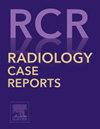Replaced unclassified right hepatic artery arising from the celiac trunk: A case report
Q4 Medicine
引用次数: 0
Abstract
Anatomical variations in hepatic arteries are both common and diverse. According to the classic classification systems, a replaced right hepatic artery typically originates from the superior mesenteric artery, supplying blood to the right liver lobe in the absence of the right branch of the proper hepatic artery. This article reports 2 cases of a rare variation, a replaced right hepatic artery arising directly from the celiac trunk. In these cases, the artery courses posterior to the common hepatic artery and then behind the portal vein within the hepatoduodenal ligament. The first case, involving a 62-year-old male with intraductal papillary mucinous neoplasm (IPMN) of the pancreas, was identified intraoperatively during a pancreaticoduodenectomy. The second case, involving a 58-year-old female with chronic sclerosing cholangitis, was detected through contrast-enhanced computed tomography angiography. Identification of such variations is critical in hepatobiliary and pancreatic surgeries to prevent serious postoperative complications. Injury to a replaced right hepatic artery can lead to biliary-enteric anastomosis dehiscence after pancreaticoduodenectomy or ischemic liver complications. While hepatic arteries display numerous anatomical variations, classic classification systems fail to encompass all these anomalies. A more comprehensive classification system, such as CRL and ex-CRL classification, is necessary to ensure safer surgical outcomes.
腹腔干引起的未分类右肝动脉置换:病例报告
肝动脉的解剖变异既常见又多样。根据经典的分类系统,被替代的右肝动脉通常起源于肠系膜上动脉,在肝动脉右支缺失的情况下为右肝叶供血。本文报告了两例罕见的变异病例,即直接来自腹腔干的替代右肝动脉。在这些病例中,动脉走向位于肝总动脉的后方,然后位于肝十二指肠韧带内门静脉的后方。第一个病例涉及一名 62 岁的男性,患有胰腺导管内乳头状粘液瘤(IPMN),是在胰十二指肠切除术中发现的。第二例病例涉及一名患有慢性硬化性胆管炎的 58 岁女性,是通过造影剂增强计算机断层扫描血管造影发现的。在肝胆胰外科手术中,识别此类变异对防止术后严重并发症至关重要。在胰十二指肠切除术或缺血性肝脏并发症后,被替代的右肝动脉损伤可能导致胆肠吻合口开裂。虽然肝动脉在解剖学上有许多变异,但传统的分类系统无法涵盖所有这些异常。有必要建立一个更全面的分类系统,如CRL和前CRL分类,以确保更安全的手术效果。
本文章由计算机程序翻译,如有差异,请以英文原文为准。
求助全文
约1分钟内获得全文
求助全文
来源期刊

Radiology Case Reports
Medicine-Radiology, Nuclear Medicine and Imaging
CiteScore
1.10
自引率
0.00%
发文量
1074
审稿时长
30 days
期刊介绍:
The content of this journal is exclusively case reports that feature diagnostic imaging. Categories in which case reports can be placed include the musculoskeletal system, spine, central nervous system, head and neck, cardiovascular, chest, gastrointestinal, genitourinary, multisystem, pediatric, emergency, women''s imaging, oncologic, normal variants, medical devices, foreign bodies, interventional radiology, nuclear medicine, molecular imaging, ultrasonography, imaging artifacts, forensic, anthropological, and medical-legal. Articles must be well-documented and include a review of the appropriate literature.
 求助内容:
求助内容: 应助结果提醒方式:
应助结果提醒方式:


